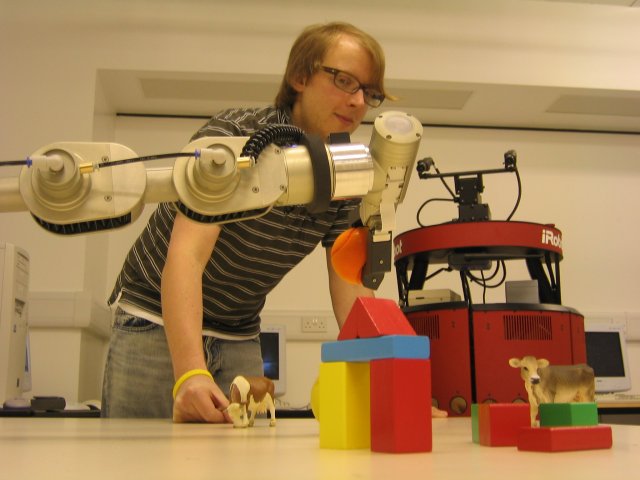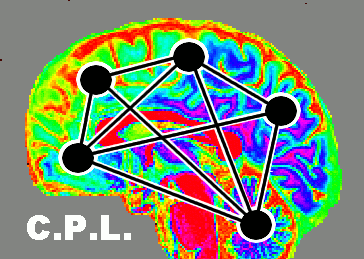









Two-day Symposium on AI-Inspired Biology (AIIB)
(Not Biologically Inspired AI -- BIAI !)
Past, ongoing and especially future influences
from AI/robotics and artificial cognition to
the study of natural cognition.
We are grateful to EUCogII for financial support.
The symposium was at
AISB2010
the 36th Annual Convention of SSAISB
on the third and fourth days: 31st March--1st April 2010
|
--
|
CONTENTS
|
--
|
There also can be, and has been, inspiration in the reverse direction, which has not been so widely recognized (illustrated here).
The symposium is an opportunity for researchers on both sides of the natural/artificial cognition divide, including biologists studying animal cognition, to acknowledge and evaluate past examples of AI-inspired biology, to report on ongoing projects, and above all to identify opportunities for new ways in which advances in our understanding of natural/biological cognition can be or need to be inspired by concepts, problems, theories and techniques from AI/Robotics, including analysis of requirements for human-like or animal-like robots.
Such advances could include: inspiring new research on cognition in humans and other animals, helping us to understand what such cognition achieves, identifying the roles of relevant features of the environment, explaining how the competences evolved, or how they develop in individuals, and proposing new information-processing mechanisms or architectures, better able to explain types of natural cognition.
Cognition in this context also includes affective processing such as motive generation, motive selection, detection of threats and opportunities and impacts on control of attention, or priorities.
Although the primary objective is to illustrate ways in which AI can influence research on natural cognition, we expect such influences to provide tests of the generality and power of AI theories as applied to artificial cognition.
The EU Cognitive Systems and Robotics initiative is also relevant.
There have been previous workshops and tutorials closely related to this one.
More information about background/context and previous events is here.
A related event, to be held on Wednesday, 10 March 2010, 11am-5:30 pm Senate House, London:
A workshop on
Inside and Outside of Computers and Minds
(also related to GC5).
The AIIB symposium will be preceded by a two-day symposium on
Mathematical Cognition (29-30th March). This should
complement the AIIB symposium usefully.
See
http://homepages.inf.ed.ac.uk/apease/aisb10/home.html
BiosciencesAI/Robotics/Philosophy
- Jackie Chappell (Biology)
[Symposium Chair and Chief Editor: Symposium Proceedings]
Email: j.m.chappell@bham.ac.uk
School of Biosciences, University of Birmingham- Susannah Thorpe (Biomechanicist)
Email s.k.thorpe@bham.ac.uk
School of Biosciences, University of Birmingham
- Nick Hawes (AI/Robotics)
Email: N.A.Hawes@cs.bham.ac.uk
School of Computer Science, University of Birmingham- Aaron Sloman (Philosophy/AI/Robotics)
[Responsible for publicity.]
Email A.Sloman@cs.bham.ac.uk
School of Computer Science, University of Birmingham
Papers were invited on problems in understanding natural cognition that require contributions from AI/Robotics, or about work in AI/Robotics that has relevance to problems in understanding natural cognition.
The symposium is about roles for AI in contributing to research on natural cognition, as opposed to research that attempts to imitate or apply aspects of how organisms work (e.g. their morphology, their neural mechanisms, their information processing architectures, their development, etc.) to solve engineering problems.
The contributions can include identification of new biological/psychological research questions prompted by design considerations in AI, or new 'design' questions prompted by empirical research on humans or other animals.
Contributions can also include lessons to be learnt for artificial cognition from attempts to use AI in understanding natural cognition.
A post-symposium report to UKCRC as part of Grand Challenge 5 can be found here.
Presentations given at the symposium, will also be made available on this web site.
Contributors will be able to submit revised versions of papers and abstracts after the symposium, to be installed on the web site.
Whether there will be any other form of publication will be decided after the symposium.
Last updated: 17 Nov 2009; 10 Dec 2009; 8 Jan 2010; 14 Jan 2010;
17 Jan 2010; 21 Jan 2010; 26 Jan 2010; 19 Feb 2010; 21 Feb 2010;
7 Mar 2010; 25 Mar 2010; 8 Apr 2010; 11 Apr 2010; 11 Nov 2010
Installed: 30 Jul 2009
Maintained by
Aaron Sloman
School of Computer Science
The University of Birmingham
-
-
-
-
-
-
-
-
-